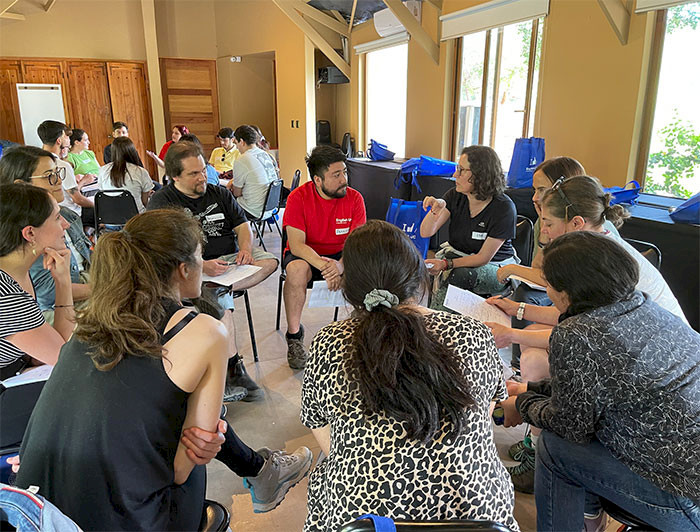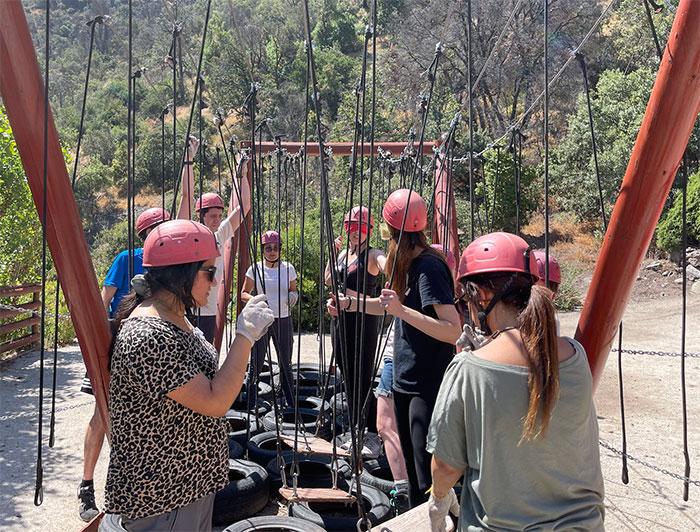
UC Chile Staff Improve Their Language Skills Through the “English for Life” Program
The initiative, promoted by the Office of the Vice President of International Affairs, the Office of the Vice President of Economic Affairs (through the Office of Human Resources) and English UC, is part of the university's internationalization process and seeks to strengthen the English language skills of those working at the institution. To date, more than 1,200 faculty, professional and administrative staff have taken the English diagnostic test.

photo_camera English for Life aims to develop the English communication skills of faculty, professionals and staff working at UC Chile. (Photo: Immersion Experience/English for Life)
Jorge Pisani, who works at the Faculty of Engineering, learned to speak English while he was in high school, but he realized as time went by that he had lost practice and found it increasingly difficult to speak English. For this reason, he decided to apply to the “English for Life” program, an initiative jointly promoted by the Office of Human Resources, the Office of the Vice President of International Affairs and English UC.
The professional had these kind words to say at the end of the course: “Since I work in IT, a lot of the technical information is in English, so participating was very useful and also helped me with my fluency.”
English for Life seeks to develop the English language communication skills of the people working at the university. “After completing the course, we expect people to feel confident when interacting with peers and others from different institutions at an international level,” said Paula Ross, academic director of English UC.
As explained by Loreto Massanés, Vice President of Economic Affairs, internationalization is an important part of the UC Chile's 2020-2025 Development Plan. She goes on to explain that a better command of English can also be very strategic to support people who come to the university from other countries. “In order to truly be an international university, we not only need to go to other countries, but also be an institution that welcomes people from abroad. We need a community committed to that mission,” she stressed.
Likewise, Lilian Ferrer, Vice President of International Affairs, “The university seeks to provide the necessary skills to enable people to successfully operate in a global society, not only to our students, but to all members of the UC Chile community. And one of those skills is in fact English. This is why we have promoted English for Life, which is not only key to the university's internationalization process, but also for people to develop and expand professionally.”
Building Community
To participate in the program, the applicants were required to first take a diagnostic test to determine their level of English. So far a total of 1,232 professors, administrative and professional staff have been tested (since 2020). Once tested, interested parties are offered various program options, according to their level. For example, this semester, 82 staff and faculty are participating in the ten conversation workshops, which range from levels B1 to C.
Ana María Sepúlveda, executive director of the Office of the Vice President of International Affairs, also participated in the course and thought it was a very enriching experience, since it allowed her to meet other university members and talk about topics of interest. “It was a combination of community building and learning English. It allowed me to feel more confident in my use of English and to realize that the level I have is enough to be able to communicate with other people.”
According to Christopher MacGuire, director of English UC, the program consists of conversation and professional development workshops, in which current topics of professional relevance are addressed by the academic team of English UC. “Through a study we found that it is very important for people to build community, talk fluently, and avoid putting all the focus on grammatical aspects,” he explained.
The course is based on a methodology that favors what is known as the communicative approach, which promotes class participation and a dynamic in which students lose their fear of English and are able to express themselves effectively.
Immersive Experience

Last Thursday, November 17 and Friday, November 18, an Immersion Experience was held in Cajón del Maipo. The experience was a first for the university and included group interaction and team-building activities in English outside the workspace.
According to Paula Ross, the initiative seeks to “test all communicative skills in English, within the framework of activities that promote linguistic interaction through collaborative and socialization tasks.” The immersion started on the bus ride, with interaction activities and then, once on site, with different activities, with a very clear rule: No Spanish allowed!
The participants were staff and faculty members who took the English diagnostic test and achieved outstanding scores that prove they can speak English fluently. The experience included a program of individual and group activities, led by teachers from the center, whose purpose was that each participant practice the use of the language in a natural way in interactions with peers in playful contexts, collaboration, negotiation and socialization, among others.
As Christopher MacGuire added, this type of experience “really exposes students to situations that take them out of their comfort zone... and presents them with a real challenge that has a positive impact on their acquisition of a new language.” He added: “We must do everything we can to increase English contact hours, self-confidence in speaking and expressing effectively, and enjoy a new international experience!”
- For people interested in participating in the program, the institutional diagnostic test will be offered at the beginning of 2023. For more information write to englishuc@uc.cl


